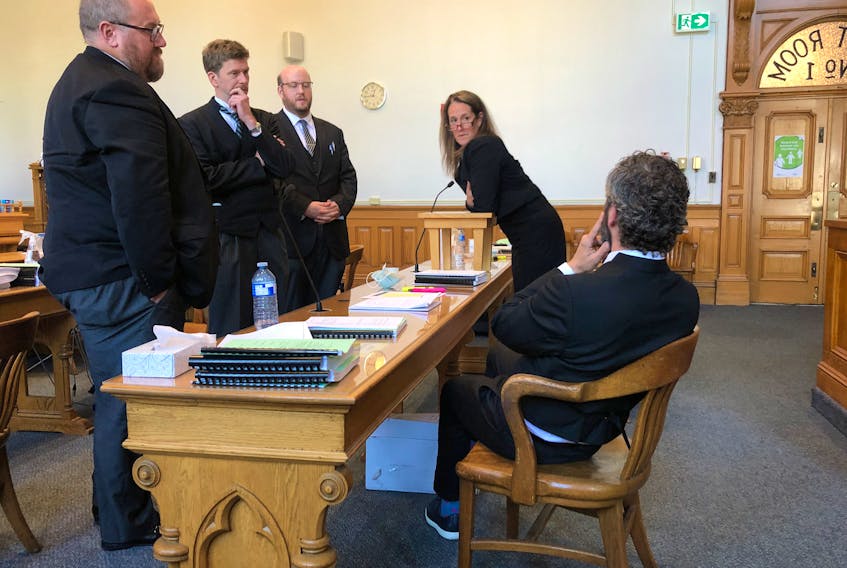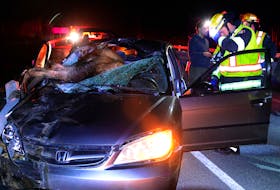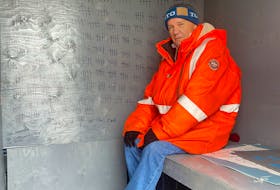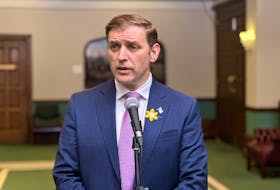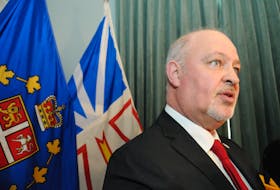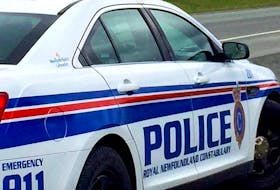ST. JOHN'S, N.L. — On the witness stand in Newfoundland and Labrador Supreme Court Wednesday, Dr. Patrick Parfrey spoke of the importance of halting the admission of COVID-19 cases to the province, but stopped short of saying he agreed with the travel ban.
Lawyer Rosellen Sullivan, representing the Canadian Civil Liberties Association (CCLA) in a constitutional challenge to the ban, asked Parfrey three times for his opinion on the controversial legislation.
“Would you say you agree with the travel ban?” she asked Parfrey.
“The two major things are preventing the importation of cases and preventing community transmission of the disease,” Parfrey replied.
“There are conditions when you’re uncertain, but there can still be cause to take action. Even now, we have insufficient evidence, but this was a situation, in my opinion, which was so serious and potentially catastrophic." — Dr. Brenda Wilson
“In terms of preventing the importation of cases, you’d argue the travel ban would do that?” Sullivan pressed.
“I’m not arguing for or against the travel ban,” Parfrey answered. “There are so many things that can be done and that’s up for discussion. I’m not here to provide discussion.”
Parfrey — a clinical epidemiologist, nephrologist, professor of medicine at Memorial University and clinical lead for Quality of Care N.L., an organization advocating for improved health care service delivery — was in court to speak about a report the province asked him to compile related to COVID-19 and population health.
Parfrey said this province has the oldest population in the country and spoke of the health-care system responding to the threat of the coronavirus, which is particularly dangerous for people older than 60.
Initial predictions provided by the province when it came to a potentially taxed health-care system were off, likely because the figures weren’t based on local information, Parfrey said.
He pointed to New Zealand’s success in eliminating the coronavirus after the country closed its borders and implemented a mandatory self-isolation period for those arriving in the country.
Parfrey was one of two witnesses to take the stand Wednesday. The other was Dr. Brenda Wilson, an expert asked by the province’s lawyers to prepare a report on public health decision-making in light of the court challenge.
Wilson, associate dean of community health and humanities in MUN’s faculty of medicine, spoke of available data about COVID-19 but a lack of evidence when it comes to the coronavirus’s cause and effect. There’s a need to act quickly regardless, she said.
“There are conditions when you’re uncertain, but there can still be cause to take action,” she said.
“Even now, we have insufficient evidence, but this was a situation, in my opinion, which was so serious and potentially catastrophic,” she said, in response to questions from lawyer John Drover, “when there is no clear evidence and it’s going to take time to get that evidence.”
Wilson acknowledged public health decision-makers must consider a wide range of health determinants, including gender, race, genetics and culture.
“You will want to think as broadly as possible and consider all possible consequences of decisions,” Wilson said.
“And would you continuously monitor the benefits and the harm to the public?” Drover asked.
“Correct,” Wilson replied.
Dr. Proton Rahman, associate dean of clinical research in MUN’s faculty of medicine, will be the next specialist to take the witness stand during the court challenge, followed by Dr. Janice Fitzgerald, the province’s chief medical officer of health.
Drover and Sullivan are challenging the province’s travel ban on behalf of their clients, the CCLA and Newfoundland native Kim Taylor, respectively, arguing that the ban violates protected human rights and is not within the provincial government’s authority.
As a response to the COVID-19 pandemic, the province implemented special measures under the Public Health Protection and Promotion Act, including the travel ban, which bans all but permanent residents, asymptomatic workers and those granted exemptions from entering the province, and was expanded last month to include residents of the Maritimes. The special measures also include increased police powers when it comes to search, seizure and detention.
Between May 4 and Aug. 3, the province approved 13,628 travel ban exemption requests. It denied 2,757 of them. Of those denied entry, 458 people have asked for the decision to be reviewed.
Taylor is a resident of Halifax who was originally refused entry in this province after the death of her mother last spring. The province reversed that decision 11 days later.
The CCLA is an independent rights watchdog. It had applied for legal standing in the constitutional challenge regarding both the travel ban and the police enforcement, but Justice Donald Burrage granted the organization the right to argue against the ban only, since none of the enforcement measures have been used.
Twitter: @tara_bradbury

